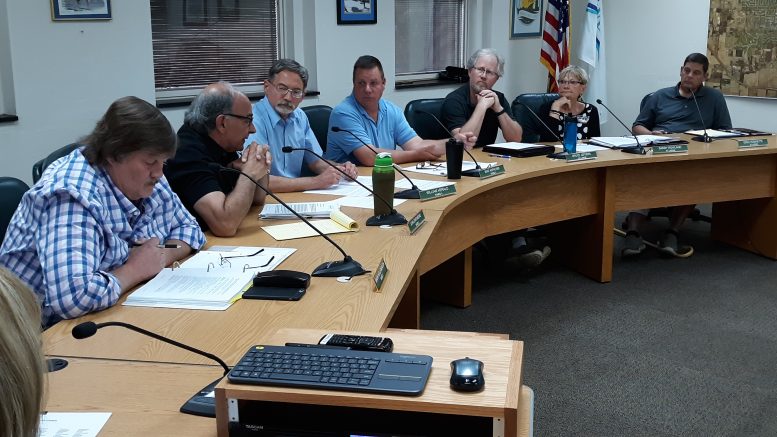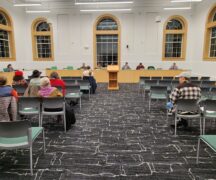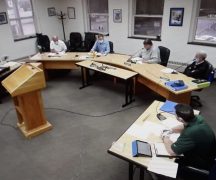By JAN LARSON McLAUGHLIN
BG Independent News
Bowling Green City Council’s debate over creating a sustainability board Monday evening made the plastic bag ban decision look easy.
Voices were raised and compromises were rejected as council’s Committee of the Whole met to discuss the formation of a sustainability board to work with the city administration on the proposed single-use plastic bag ban. The board would rule on appeals from businesses claiming hardships to the plastic bag ban, and work on future environmental projects.
The conflict revolved around a memo sent to City Council by Municipal Administrator Lori Tretter. In the letter, Tretter explained the work required to create a volunteer board and keep it functioning well, the appeals process already established by the city, and the possibility that the sustainability board would create a lot of additional work that the reduced level of city employees just don’t have time to do.
“I see there are a lot of points made by Lori that are very, very important,” council member Sandy Rowland said.
But council member Bill Herald said the sustainability board could help lighten the load for city staff, rather than add burdensome tasks. He also stressed that the creation of a sustainability board was a byproduct of many meetings of council’s Community Improvement Committee as it discussed the plastic bag ban.
Council member Greg Robinette said council should give deference to Tretter’s concerns. The sustainability board could result in “force feeding” work to the city administration.
“I don’t believe we need to make the job of our limited staff harder,” Robinette said.
But council member Mark Hollenbaugh, who did a lot of research during the months of the bag ban discussion, objected to efforts to sink the sustainability board.
“I do not accept the fact that I’m not qualified to make a judgment” on the issue, Hollenbaugh said. “I think for a bag ban to be in any way effective, the board must exist.”
Council member Bruce Jeffers asked what the sustainability board would be charged with doing.
“I guess I want to know what the board is going to do besides plastic bags,” Jeffers asked.
Hollenbaugh responded that the board would work on the educational component of the bag ban, to ease the transition period.
“The public has to be willing to do it,” for the ban to be a success, Hollenbaugh said.
The board would likely perform a periodic review of the bag ban ordinance and its impact, and look at future sustainability issues revolving around “Bowling Green’s commitment to being environmentally friendly,” Hollenbaugh said.
Council President Mike Aspacher said an appeals board will be needed to hear hardship cases when the ban goes into effect, but more time may be needed to create a full-fledged sustainability board. He pointed out that the council committee’s initial charge was to study the issue of banning plastic bags – not creation of another board.
Herald loudly objected to that limitation, saying the council committee can discuss any issue it desires. He also disputed the concerns that a sustainability board would further burden city staff.
“You’re ignoring the possibility the sustainability board could relieve the workload,” Herald said. “There’s no force feeding.”
Robinette suggested that in future discussions about the sustainability board, that the council committee and city administration meet together.
“Not an exchange of papers,” he said. “But a human discussion.”
Council member John Zanfardino mentioned there have been times in the past when council and city administration are temporarily at odds over an issue.
“I think council does things sometimes that the administration doesn’t agree with,” he said.
Bruce Jeffers agreed, saying “Our job is to say this thing should happen. And their job is to figure out how to manage it.”
Robinette suggested council slow down the process, since council hasn’t even seen the proposed plastic bag ban ordinance language yet.
“We have time to get this right. This isn’t a done deal,” he said.
Rowland wanted to make sure the duties assigned by the board are manageable for the administration.
“I want a sustainability board, I really do,” she said. “I just want to do it right.”
Herald offered some changes to the sustainability board issue – such as requiring the board to meet quarterly rather than monthly, requiring variances to be for two years rather than one year, and delaying the formation of the board until July 1, 2020. The ban isn’t scheduled to take effect until Jan. 1, 2021.
Those changes, paired with the plastic bag ban in a single piece of legislation, failed by a vote of 3 to 4.
A second vote was then taken to proceed with the plastic bag ban and work with the city administration to create an appeals board. The sustainability board formation would be decided, possibility later, in a separate piece of legislation. That passed by a vote of 5 to 2.
Herald and Hollenbaugh voted against the second motion because they believe the creation of a sustainability board is a vital part of the plastic bag ban, and should not be dealt with separately.
Herald also asked to discuss the possibility of the plastic bag ban going on the November ballot for citizens to decide. But council already voted earlier this month to make the decision itself, rather than putting it on the ballot. And Aspacher said he had not heard from any other council members about wanting to change their decisions.
Aspacher said he hopes the language for the plastic bag ban will be available for council to have a first reading at its July 1 meeting.
Herald asked if a special meeting could be scheduled for between council’s July 1 and July 15 meeting. That would provide time for a second reading, more public comments, and give citizens time to file a referendum if they want to put the issue on the public ballot.
“My feeling is that’s unnecessary,” Aspacher said, with other council members voicing support. “We’ll proceed with our normal process.”





